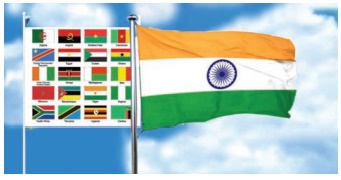Chapter: 12th Political Science : Chapter 9 : India and the World
India-Africa Relations
India-Africa Relations

Introduction
Asia and Africa are home to some of the most
ancient civilizations in the world. They have enjoyed significant trade,
cultural, economic, and political exchanges for over a millennium. Trade
included items such as carved beads, cotton, and terracotta for soft carved
ivory and gold. The earliest known exchanges are that of food crops and
domestic livestock which date back to the second millennium BCE. The first-ever
written account of such a trade relationship was that of a 10th century
Byzantine logbook that came to be known as the ŌĆśPeriplus of the Erythraean SeaŌĆÖ
or a guidebook to trade along the Red Sea. In the following centuries, the
interests of both entities have expanded and diversified.
Post-War Era
The Indian independence was declared in the year 1947.
It is notable however that most African countries were very intent on seceding
from the influence of Europe.
Ever since India declared independence, it had
raised its voice for African liberation representing their case at multiple
international forums. The end of racial struggle and decolonization became the
rallying point of IndiaŌĆōAfrica relations.
NAM and Africa
The Non-Aligned Movement was conceptualized as a
response to the formation of power-blocs in the USA and the USSR during the
cold war. In order to prevent a third world war, the newly decolonized
countries of Africa, Asia, and Latin America declared neutrality. A key role
was played in this process by the then Heads of African State of Egypt and
Ghana along with India, Indonesia and Yugoslavia.
NAM was also started as an anti-colonial alliance to
prevent the regression of its countries to war resource hosts. Africa being the
nest of colonies, began resistance movements against the colonial forces with
resounding successes. In the years it took to dismantle the systemic racism and
slavery in the continent, Dr Nkrumah along with the other founders of NAM
declared that Africa shall always be the first to fight racial discrimination
and maintain the principles of Non-Alignment. The post-Nehruvian India in the
1970s carried forward the anti-imperialistic and anti-racial worldview.
Indian Diaspora in Africa
Diaspora refers to people of a specific ethnic
background establishing a community far away from their native lands. The
Britishers shipped many Indian labourers to the Afro-Carribean islands to produce
sugar, rubber, and other cash crops. An estimate of 769,437 Indians
migrated to Mauritius, South Africa, Reunion Island, Seychelles, and East
African region during the colonial period. Currently, Durban in South Africa is
home to 1.3 million Indians. It is the largest Indian city outside India,
followed by Mauritius and the Reunion Islands.
Asia-Africa
Growth Corridor: The Asia-Africa
Growth Corridor (AAGC) is an India-Japan economic cooperation agreement aimed
at the socio-economic development of Asia and Africa. The vision document for
AAGC was released by India in the 2017 African Development Bank meeting. The
aim of the AAGC is to develop infrastructure and digital connectivity in Africa
through India-Japan collaboration. It is viewed as an India-Japanese response to
ChinaŌĆÖs Belt and Road Initiative (BRI).
Related Topics